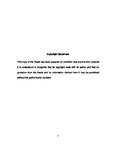Holistic Approach to the Factors Affecting Individual Investor’s Decision Making in the GCC Markets: Evidence from Oman and Saudi Arabia
| dc.contributor.supervisor | El-Masry, Ahmed | |
| dc.contributor.author | AL-Alawi, Alamir Nasser Salim | |
| dc.contributor.other | Plymouth Business School | en_US |
| dc.date.accessioned | 2017-03-13T12:00:19Z | |
| dc.date.issued | 2017 | |
| dc.identifier | 10369698 | en_US |
| dc.identifier.uri | http://hdl.handle.net/10026.1/8609 | |
| dc.description.abstract |
Behavioural finance studies have documented that investors are subject to psychological factors (cognitive and emotional) and demographic factors (internal), and external factors that make their financial decisions less than fully rational. However, most of these studies have concentrated on developed countries and few on emerging countries. This study is aimed at investigating the internal and external factors that influence individual investors’ financial decision making in the Kingdom of Saudi Arabia and the Sultanate of Oman. It contributes to the behavioural finance literature by filling the gaps existing in the GCC countries in particular and emerging countries in general. The study adopts a holistic approach in using perspective theories in the analysis of data collected using questionnaires from 620 individual investors in Saudi Arabia and 590 individual investors in Oman. The data collected is analysed using the partial least squares structural equation modelling (PLS-SEM) in order to understand the behavioural constructs developed. The study has revealed that religiosity factors have a significant influence on individual investors in both the Kingdom of Saudi Arabia and the Sultanate of Oman. However, the impact was negative in the Kingdom of Saudi Arabia but positive in Oman. Positive psychological capital and psychological (cognitive and emotions emotional) factors are found to have a positive influence on investors’ decision making. Among these internal factors, religiosity factors have the highest impact while positive psychological factors have the least effect. In the Kingdom of Saudi Arabia, investors’ decision making is positively significantly affected by economic factors and ethical and social factors, while political factors, governance and environmental factors and cultural factors do not significantly influence investors. In the Sultanate of Oman, however, political factors and cultural factors have a positive influence, while corporate governance and environmental factors influence investors negatively. Economic factors do not influence investors’ decision making in the Sultanate of Oman, contrary to the observed effect in the Kingdom of Saudi Arabia. The study indicates that there is a difference between the Kingdom of Saudi Arabia and the Sultanate of Oman’s individual investors in relation to the study variables, except for the cultural and psychological (cognitive and emotional) variables. These results have important implications on investors’ participation and future development of financial markets in the Sultanate of Oman and the Kingdom of Saudi Arabia. | en_US |
| dc.description.sponsorship | The government of Sultanate of Oman | en_US |
| dc.language.iso | en | |
| dc.publisher | University of Plymouth | |
| dc.rights | CC0 1.0 Universal | * |
| dc.rights.uri | http://creativecommons.org/publicdomain/zero/1.0/ | * |
| dc.subject | Behavioural finance | en_US |
| dc.subject | Individual Investor’s Decision Making | |
| dc.subject | GCC Markets | |
| dc.subject.classification | PhD | en_US |
| dc.title | Holistic Approach to the Factors Affecting Individual Investor’s Decision Making in the GCC Markets: Evidence from Oman and Saudi Arabia | en_US |
| dc.type | Thesis | |
| plymouth.version | publishable | en_US |
| dc.identifier.doi | http://dx.doi.org/10.24382/988 | |
| dc.identifier.doi | http://dx.doi.org/10.24382/988 | |
| dc.rights.embargodate | 2017-09-13T12:00:19Z | |
| dc.rights.embargoperiod | 6 months | en_US |
| dc.type.qualification | Doctorate | en_US |
| rioxxterms.version | NA |
Files in this item
This item appears in the following Collection(s)
-
01 Research Theses Main Collection
Research Theses Main



